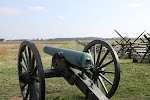
While World War II raged across the globe, Americans back on the homefront were heavily engaged in the war effort. There were training camps, military maneuvers, war bond events, and scrap drives. Rationing of food, rubber, and gasoline were necessary to fulfill military needs. Unlike the current Mideast conflict, World War II affected everyone personally and most people did their part to support their country.
One of the most fascinating aspects of homefront life during WWII was the presence of prisoner of war camps across America. There were hundreds of them, housing mostly German and Italian troops. The Japanese rarely allowed themselves to be taken prisoner. Camp Ruston, Louisiana was one of the largest in the country.
In June 2006, I met a former German prisoner of war when he returned to visit Camp Ruston. Horst Blumenberg lived at Camp Ruston from October 1944 to January 1946 after being captured in the middle of the Atlantic Ocean. Blumenberg was a sailor on the submarine U-664. "We were attacked, and when we tried to fire, our torpedo got stuck in the tube,” Blumenberg said. “We were on a crash dive. The first people who came out (of the submarine) were shot. I was the last one off and swam eight and a half hours before I was picked up by the USS Borie.”
Blumenberg was eventually transferred to an interrogation camp near Arlington, Virginia. He was the only one of his captured crew that was not sent to a Nazi camp in Arizona. “I was the only one at Camp Ruston. I said I wasn’t a Nazi,” he explained. “In 1943, it was a very dangerous thing to do that. If Hitler had won the war, I would have been a dead duck.”
Many German soldiers and sailors did not consider themselves Nazis. While some were very hardcore Nazis, many were just ordinary men who were drafted into the army.
Blumenberg brought several pieces of memorabilia with him to present to Louisiana Tech University, the repository for Camp Ruston archival materials. He allowed me to escort him to the site of old Camp Ruston and spent an hour talking about his experiences. I had previously interviewed Horst by phone and e-mail for a book I wrote about the U-boat sailors at Camp Ruston. In addition of Blumenberg, the entire crew of the U-505, the first enemy vessel captured by the U.S. since the War of 1812, was held at Camp Ruston.
Many German soldiers and sailors did not consider themselves Nazis. While some were very hardcore Nazis, many were just ordinary men who were drafted into the army.
Blumenberg brought several pieces of memorabilia with him to present to Louisiana Tech University, the repository for Camp Ruston archival materials. He allowed me to escort him to the site of old Camp Ruston and spent an hour talking about his experiences. I had previously interviewed Horst by phone and e-mail for a book I wrote about the U-boat sailors at Camp Ruston. In addition of Blumenberg, the entire crew of the U-505, the first enemy vessel captured by the U.S. since the War of 1812, was held at Camp Ruston.
After several years and many camps, Blumenberg finally made it back to Germany. His family had never heard of his fate.“By the time I got home, it was September 1947, and the war was over in 1945,” he said. “The few letters I wrote (as a POW) were heavily censored, and I never saw them again." As soon as Horst got home to Germany, he told his mother he was going back to America as soon as possible. He now lives in Kentucky and has been an American citizen for 50 years.
More to come on Camp Ruston....
Photo: Horst Blumenberg near one of the two remaining buildings at the Camp Ruston site, 2006














Wesley Harris, please call me at your earliest opportunity about the U-505 photos in MSI's possession...Tom Waller Jr. great nephew of Walt Waller Boat Engineer Salvage Boat 1
ReplyDeletePLEASE ASAP
253-347-8462 or chiefwalleye@gmail.com